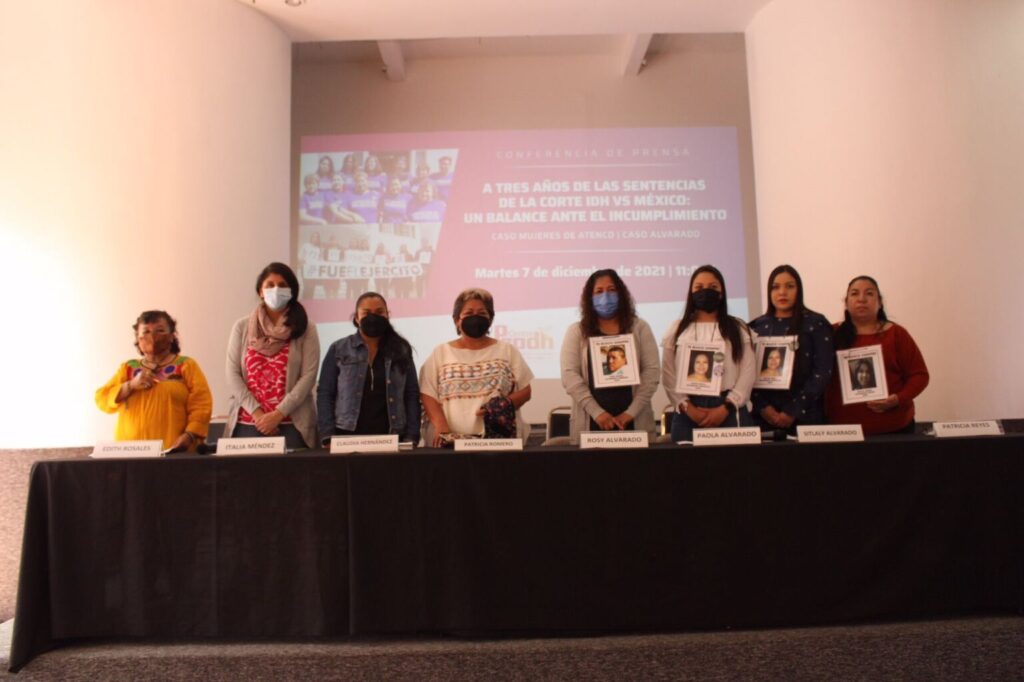· The victims in both cases denounce a lack of commitment by the State to comply with its international obligations derived from both rulings.
· Obstacles to access justice and truth in both cases persist, and the authorities responsible for the investigations have failed to comply with what is ordered by the international court.
Mexico City, Chihuahua, December 7th, 2021. Three years after two judgments were issued by the Inter-American Court on Human Rights (IACHR) in the “Alvarado Espinoza and Others” and “Women victims of sexual torture in Atenco” cases, both against Mexico, the obstacles that the victims continue to face in accessing truth and justice reveal a lack of commitment by the State to comply with its international obligations.
Both sentences were notified in the first days of the current federal administration, addressing very relevant issues on the current human rights agenda in the country. On the one hand, the “Alvarado” case has to do with the enforced disappearance of three members of the Alvarado family in 2009, at the hands of members of the army and in a context of deep militarization in Chihuahua; the “Atenco” case refers to the acts of sexual torture and other serious human rights violations committed against 11 women in the framework of the police operation of May 3rd and 4th, 2006 in Texcoco and San Salvador Atenco.
Although the compliance processes for both judgments are independent, in both cases there is a lack of commitment which would lead to coordinated compliance processes, where the various bound and involved entities act diligently and sustainably; this has meant that most of the ordered measures, both individual and structural, are unmet, and even, in some cases, show evidence of regression.
Failure to comply with these obligations has prevented victims from accessing justice and truth, even with an international judgment. In the case of the Alvarado family, 12 years after the events, the whereabouts of the victims remain unknown, and the authorities have yet to investigate the involvement of military personnel. In the Atenco case, no significant steps have been taken to investigate every level of responsibility, including the chain of command of the three corporations involved,
while the Attorney General of the State of Mexico continues to obstruct the investigation, by refusing to fully attract the case to federal jurisdiction, eliciting no more than a complacent response from the Attorney General’s Office, the FGR.
Thus, a path that should have been one of justice and reparation re-victimizes complainants despite the fact that, in its discourse, the State has promised to comply with the resolutions of the Inter-American Court, which the State is bound by.
Furthermore, both judgments are also related due to current human rights issues in the country, since the Inter-American Court analyzed in both cases various aspects Mexican law enforcement actions.
In the Alvarado case, for example, the Court determined that citizen protection must be primarily reserved for the civil police forces and that, when the Armed Forces intervene in an exceptional situation, their participation must be subordinate, supplementary, regulated and supervised.
In the Atenco case, among the no-recurrence measures, the creation of an Independent Observatory was ordered to monitor the use of force by the Federal Police, which later became what today is known as the National Guard, and which has become a primarily military corporation. The deadline to create this observatory expired in 2020.
Reviewing non-compliance in both judgments, in light of the standards developed by the Court in matters of citizen protection, entails recognizing a regression in compliance with the State’s human rights obligations, which can only be reversed if steps are taken in justice processes, but also in compliance with the structural measures ordered by the Court.
Three years after both rulings were issued, the Mexican State still has an opportunity to demonstrate, with specific internal actions that help victims access justice and reparation, its true openness to scrutiny and its commitment to fulfill its international responsibilities.
Media contact:
Alicia Guillen / Cedehm
+52 1 614 142 0946
Naim Camacho / Centro Prodh
+52 55 8531 2218




